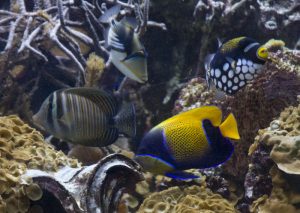Our February issue this year is particularly heavy in content – something we are proud of. What is especially important to us is the high level of scientific investigation we are providing our readers with. Advanced Aquarist has always tried to offer as much material as available to us that is experimentally and therefore factually based. Toward this end we are very grateful to researches like Dana Riddle, Sanjay Joshi, Jake Adams, and now Ken Feldman and his colleagues. What is especially true of the work done by these scientists is that most of it is experimentally based, not simply a synopsis of someone else’s work.
I’ve often been asked what is a science, or what is the scientific method? To this question I sometimes reply, ‘it is the disinterested pursuit of the truth.’ The critical word here is ‘disinterested.’ But, what does that mean? For one thing it means that the conclusion, truth or theory reached is not ideally influenced by whether it makes us happy or sad, whether we like it or not. In fact, it is the goal of the scientific researcher to eliminate him or herself from the experiment. A scientist doesn’t begin with a belief, privatively held or supernaturally ordained. A researcher begins with a collection of observable and or measurable phenomena. The researcher than develops a hypothesis about this phenomena, which is then subjected to experimentation to determine whether the hypothesis or conclusion regarding this specific collection of phenomena is repeatable. For example, if one adds chemical A to chemical B, and there are no other conditions or variables introduced, it
results in the formation of chemical C. And, every time this mixture is undertaken C is produced – this is called in scientific circles, repeatability. Furthermore, it doesn’t matter whether the experimenter or anyone else for that matter likes or dislikes what is then called a theory. Usually, scientists will then share their theories, so that other researchers can retest these conclusions or theories.
The philosophical terminology the scientific method uses is called induction (aposteriori reasoning), as opposed to deduction (apriori reasoning). The dictionary defines aposteriori as, 1. from particular instances to a general principle or law; based upon actual observation or upon experimental data: a posteriori argument that derives the theory from the evidence. Similarly, the dictionary defines apriori reasoning as, 1. from a general law to a particular instance; valid independently of observation. 2. existing in the mind prior to and independent of experience, as a faculty or character trait. Cf. a posteriori (def. 2) 3. not based on prior study or examination; nonanalytic: an a priori judgment. Religious belief uses deductive reasoning, whereas, science employs inductive reasoning – astrology (deductive) compared to astronomy (inductive) for example. Without science it is very unlikely that we could send a space ship to the moon, and for that
matter have successful reef tanks.













0 Comments